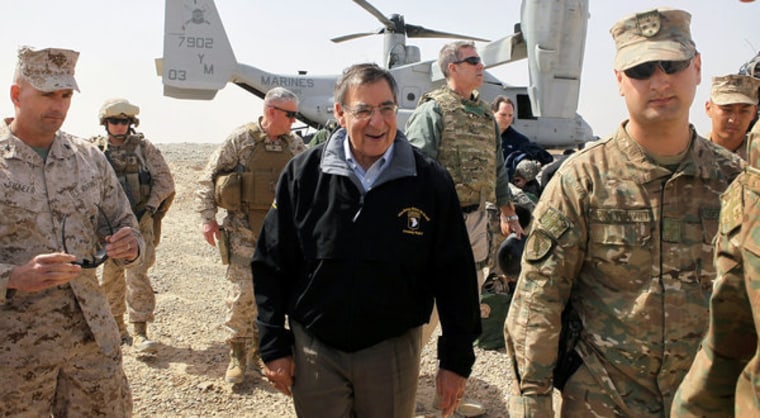Defense Secretary Leon Panetta was in Afghanistan yesterday assessing what he already knows to be a very unstable situation. It took mere minutes upon landing on Afghan soil for him to realize just how out of control. As his plane was touching down, an Afghan driver sped a stolen truck onto the runway, emerging on fire from the vehicle. Panetta himself emerged unscathed and proceed to his planned meeting with Marines at Camp Leatherneck. (Incidentally, all those present during the Secretary of Defense’s remarks were asked to disarm). While Panetta’s visit was long scheduled but unannounced (as per the custom to protect his security), it comes at a time that has taken on new sense of urgency. It comes on the heels of the Quran burning fiasco, which lead to weeks of protests and fatal attacks on U.S. military, and the recent incident of the U.S. soldier who killed 16 Afghan civilians in an unprecedented rampage. At his first meeting of the day, Panetta told Marines,
“We will be challenged by our enemies, we will be challenged by ourselves, we will be challenged by the hell of war itself.”
When we try to make sense of Afghanistan, Panetta’s statement may be the most clarifying for the current state of affairs. However, tragic and well outside of suitable rules of engagement, our troops are nothing short of war-weary. General John Allen, the commander of all U.S. and NATO forces in Afghanistan, on Monday tried to downplay the effect of these recent events on U.S.-Afghan relations:
“...we are going to ensure that this relationship, which is resilient and possesses a lot of shock-absorbency, that this relationship is the one that defines the success of our campaign that we are going to push on.”
Shock absorbent is a key characteristic of a people who have had to endure 30 years of conflict from civil war, to Soviet occupation and a decade of American and NATO forces there. The Afghan people embody the very words "war-weary," and yet reports of escalated violence in the region of late suggest that the shock is being absorbed through reactivity.
You know our domestic politics have become war-weary when you have Republican presidential candidate Newt Gingrich is calling for an immediate withdrawal from Afghanistan. Reports are detailing a possible shift in party-wide Republican thinking on Afghanistan. The Obama administration itself is considering a speedier draw-down. All against the backdrop of an American public who no longer thinks that the war in Afghanistan is worth fighting.
This war has exacted a unique physical, diplomatic, domestic, monetary, and psychological cost on both for the soldiers who fight it, and both the American and Afghani people. The metaphor of Secretary Panetta's visit only bears that out.
